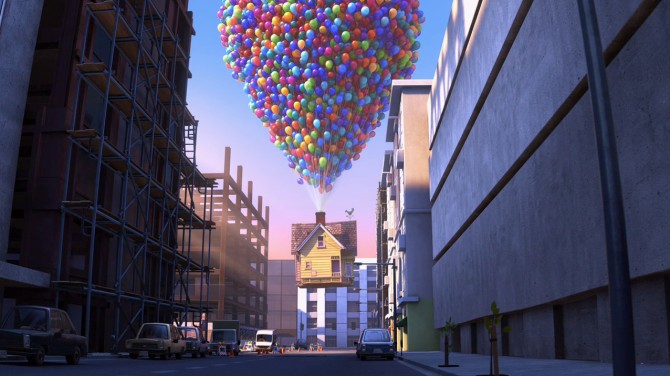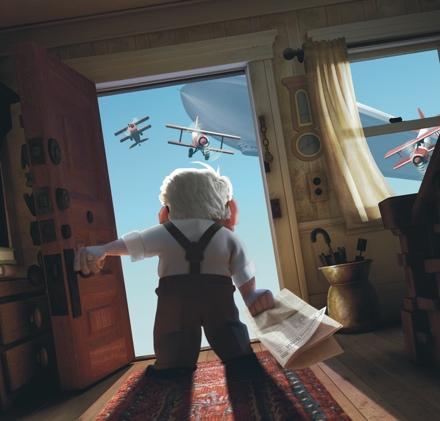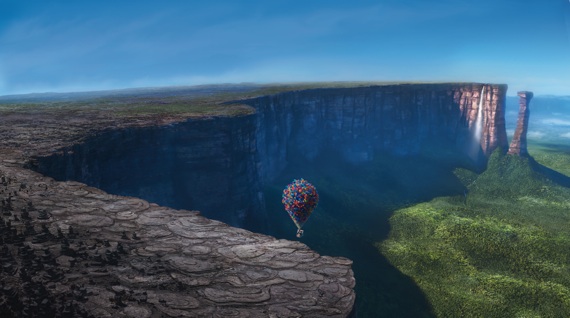 Pete Docter was born to be a storyteller, and he continues to live out that dream. The co-writer with John Lassiter on Toy Story (1995) and Toy Story 2 (1999) and a co-writer with Andrew Stanton on Wall-E (2008), he was the co-director and lead writer for Monsters, Inc (2001) and the co-writer and co-director of Up with Bob Peterson. He has been nominated for an Oscar six times and though only in his early forties, Docter has already received a lifetime achievement award from the Venice Film Festival.
Pete Docter was born to be a storyteller, and he continues to live out that dream. The co-writer with John Lassiter on Toy Story (1995) and Toy Story 2 (1999) and a co-writer with Andrew Stanton on Wall-E (2008), he was the co-director and lead writer for Monsters, Inc (2001) and the co-writer and co-director of Up with Bob Peterson. He has been nominated for an Oscar six times and though only in his early forties, Docter has already received a lifetime achievement award from the Venice Film Festival.
An introverted geek during his school days, Docter loved to daydream and create fantasies as a kid. He loved to imagine other worlds, to make up stories. After a family trip to Disneyworld, for example, he returned home to Bloomington, Minnesota, where he turned his room into an imitation of the theme park’s Enchanted Tiki Room, packing it full of animated, Hawaiian kitsch. Later, after a year of university, he transferred to California Institute of the Arts where he won a Student Academy Award for “Next Door,” a hand-drawn cartoon about a cranky old man and an overly perky neighborhood girl (perhaps an inspiration for his later Academy Award winning Up).
 Still a kid at heart, Docter chose upon graduation not to take a job writing for the Simpsons, deciding instead to go to work for a start-up animation company named Pixar. There he could play laser tag in the dark with his colleagues, after spending the day collaborating in their story-telling ventures. He also joined First Presbyterian Church in Berkeley where he remains active today. From Disney, Docter says he learned in his storytelling to balance each laugh with a tear. And from his Christian faith and family, he learned the values of family, intimacy, and caring about others, all others.
Still a kid at heart, Docter chose upon graduation not to take a job writing for the Simpsons, deciding instead to go to work for a start-up animation company named Pixar. There he could play laser tag in the dark with his colleagues, after spending the day collaborating in their story-telling ventures. He also joined First Presbyterian Church in Berkeley where he remains active today. From Disney, Docter says he learned in his storytelling to balance each laugh with a tear. And from his Christian faith and family, he learned the values of family, intimacy, and caring about others, all others.
From this twin base, Docter has become a central figure in shaping the stories a whole generation lives by. His stories have provided hope to young and old alike as they embody his Christian understanding of what it is to be fully human. Docter’s imaginative and whimsical stories have helped all of us find joy in our lives, even as they have helped Pixar’s meteoric rise to the top of the animation ladder. This is true for all his films, but perhaps it is particularly true of his brilliant, unlikely hit, Up.
 Pixar’s tenth movie, Up continues this studio’s string of unlikely heroes. This time, a grumpy 78 year old balloon salesman, Carl Fredricksen (Ed Asner), who is filled with grief over the death of his soul mate and wife Ellie, is cast in the role. Certainly a strange lead character for a “children’s” movie – but then, Pixar’s animated movies have always been for the whole family. Here is an intergenerational film that will provoke great discussion.
Pixar’s tenth movie, Up continues this studio’s string of unlikely heroes. This time, a grumpy 78 year old balloon salesman, Carl Fredricksen (Ed Asner), who is filled with grief over the death of his soul mate and wife Ellie, is cast in the role. Certainly a strange lead character for a “children’s” movie – but then, Pixar’s animated movies have always been for the whole family. Here is an intergenerational film that will provoke great discussion.
On the surface, the movie is an adventure story depicting the adventures of Mr. Fredricksen and Russell, a chubby, eight-year-old, junior wilderness explorer who badgers the cranky senior citizen to help him get his final badge (for “assisting the elderly”). In grand Pixar style, one filled with simple, yet glorious visuals, the two take a road trip like few others. They soar to Paradise Falls, South America (drawn to remind us of Venezuela’s Angel Falls) in Mr. Fredricksen’s memory-filled house, carried aloft by thousands of colorful, helium-filled balloons.
But like all road movies, Up is more about the relationship that develops, than the adventures on the road. The two lead characters meet up with packs of dogs, dangerous cliffs and frightening weather, not to mention an embittered explorer, Charles Muntz, who chases after them. But adrenalin is not the heart of the movie. Rather, Up is about love and friendship.
The set-up, or prologue, to the road trip takes twelve minutes – twelve of the finest minutes of animation ever filmed. We see Carl and Ellie meet, two misfit kids who perfectly match. Their romance and subsequent seventy years together are as tender and sweet as anything you can imagine. In a four minute wordless montage of photos, interpreted only by Michael Giacchino’s evocative music, we experience their dance of life. Carl and Ellie’s hopes and dreams become ours, together with their all too real disappointments. In particular we see how their dream of a trip to the legendary Paradise Falls must be repeatedly postponed given flat tires, home repairs, and health bills that must be paid. So when Ellie dies, Carl is left a broken man, alone in a house full of memories and a dream still unfulfilled.
 Into this situation steps the roly-poly Russell (Jordan Nagai). He knocks on Mr. Fredricksen’s door, hoping somehow to help him and thus earn his merit badge. Though there is seventy years difference in age, they have more in common than one might think, sharing both loneliness and unfulfilled dreams. Though it takes most of the movie and countless adventures for them to discover what we as viewers sense early on, their friendship does blossom.
Into this situation steps the roly-poly Russell (Jordan Nagai). He knocks on Mr. Fredricksen’s door, hoping somehow to help him and thus earn his merit badge. Though there is seventy years difference in age, they have more in common than one might think, sharing both loneliness and unfulfilled dreams. Though it takes most of the movie and countless adventures for them to discover what we as viewers sense early on, their friendship does blossom.
As the movie ends, the two are sitting on the curb in front of Fenton’s Ice Cream (an homage to a real life creamery near Pixar headquarters which my wife and I have enjoyed personally), counting red and blue cars like Russell said he did with his dad. “It might sound boring,” Russell opines, “but I kinda think it’s the boring stuff I remember the most.” Love and friendship turn out to be the real adventure, something Carl first discovered in the pages of Ellie’s scrapbook, “My Big Adventure”. Now again with Russell, we find portrayed through Carl a simple spirituality of everyday life. It is an adventure more breathtaking than even soaring balloons.
 The central metaphor of this movie is the house Carl lives in. In the beginning it symbolizes his shared life with Ellie. It is more than a house; it is their home. Thus, when Ellie dies, Carl holds on tenaciously to it, not letting the house be bulldozed to make room for new buildings. Failing, however, in his attempt to save their home, he chooses to put the house afloat with his helium-filled balloons. If Ellie died before they could go to Paradise Falls together, he will take their house filled with her memories to the Falls! But ultimately, when Russell needs him to, Mr. Fredricksen is willing to leave the house behind, despite its priceless memories. He cuts it loose in order to be true to his new friend. As one film reviewer perceptively observes, the house is an astounding metaphor for Carl’s journey through love, grief, loyalty, and malaise, to a final acceptance and a hard-won peace.
The central metaphor of this movie is the house Carl lives in. In the beginning it symbolizes his shared life with Ellie. It is more than a house; it is their home. Thus, when Ellie dies, Carl holds on tenaciously to it, not letting the house be bulldozed to make room for new buildings. Failing, however, in his attempt to save their home, he chooses to put the house afloat with his helium-filled balloons. If Ellie died before they could go to Paradise Falls together, he will take their house filled with her memories to the Falls! But ultimately, when Russell needs him to, Mr. Fredricksen is willing to leave the house behind, despite its priceless memories. He cuts it loose in order to be true to his new friend. As one film reviewer perceptively observes, the house is an astounding metaphor for Carl’s journey through love, grief, loyalty, and malaise, to a final acceptance and a hard-won peace.
As Docter recognizes, life has a way of gifting us, even in our despair, with new possibilities, new relationships, the blossoming of new love, even new homes. (I am writing this review having just spoken to a colleague here at Fuller whose wife died tragically as a young woman of cancer, leaving him with a young daughter, a home full of memories, and dreams unfulfilled.) After several years of grief, he has just remarried. He told me he is looking for a new house to rent that will allow for new memories – a new home for his family. “Margery would have wanted this. It is good.”
In Up, the adventure Docter creates is fun and the humor continuous, but it is the love and friendship that is displayed which proves wondrous. The hopes and disappointments of Carl and Ellie make you cry. Their love is set amidst dreams deferred and ambitions renegotiated, and it is all the more real for it. But the ensuing friendship between Carl (Mr. Fredricksen) and Russell proves also to be wonder-filled. Though the trip to Paradise Falls is spectacular, the enjoyment of shared ice cream is even better. “A man of many companions may come to ruin, but there is a friend who sticks closer than a brother.” (Proverbs 18:24).
Dr. Rob Johnston is Professor of Theology and Culture at Fuller Theological Seminary and founding member and Co-Director of Reel Spirituality. His book by the same name, Reel Spirituality, is the foundational text on engaging theologically with cinema. He also published Useless Beauty, which holds Ecclesiastes up to a number of acclaimed films and examines the ways the text and films inform each other. Along with his wife, Catherine Barsotti, he has published FInding God in the Movies, and he is currently working on a book on God’s wider revelation in the world.
